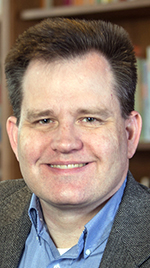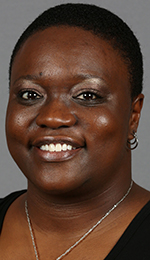Free speech is the lifeblood of colleges and universities.
The civil liberty must be protected and encouraged, according to Keith E. Whittington, author of “Speak Freely: Why Universities Must Defend Free Speech.”
Whittington, the William Nelson Cromwell Professor of Politics at Princeton University, will be the keynote speaker at the second annual University of Wisconsin-Stout Center for the Study of Institutions and Innovation Civil Liberties Symposium Monday, March 18, and Tuesday, March 19.
Whittington, whose book published by Princeton University Press won the Association of American Publishers PROSE Award for Education, will talk about how without free speech a university cannot fulfill its most basic, fundamental and essential purposes, including fostering freedom of thought, ideological diversity and tolerance.
Whittington explains why free speech and civil discourse are at the heart of the university’s mission of creating and nurturing an open and diverse community dedicated to learning. Universities must make space for diverse voices from the left and right, he notes.
“He’s written a book that is much more accessible to the average reader,” said Tim Shiell, center director. “He is really taking more of an ethical or moral view on why free speech is important as a value of the university and how it makes the university stronger. We don’t want things at the university to become dogma. We want beliefs challenged.”
Whittington, who is a fellow with the National Center for Free Speech and Civic Engagement, will speak from 3:35 to 5 p.m. March 18, in Ballroom A of the Memorial Student Center. Respondents will be Eric Kasper, political science and director of the Center for Constitutional Studies, UW-Eau Claire, and Shiell. Provost Patrick Guilfoile will moderate the presentation.
The symposium includes nine sessions over two days. Topics include black voting rights in the U.S.; politics and free speech in the classroom; and the biopolitics of food. For a complete listing go here.
Having a symposium is important because Americans tend to take their civil liberties for granted, Shiell said. “Our nation is founded on the idea civil liberties are essential to the operation of government and our rights as citizens. We just assume so much that we don’t even think about them, like our right to vote, free speech, freedom of religion and the press and due process under the law. That’s what we want people to think about.”
Last year the audiences had lively questions and discussion. Shiell wants to see that repeated. All events are free and open to the public.
Sessions on March 18 in the Willow and Walnut rooms of the Memorial Student Center include:
- “The Spatial Dimensions of Church and State,” 11:15 a.m. to 12:10 p.m., presenter John Blakeman, political science, UW-Stevens Point; respondent Jim Szymalak, public administration, UW-La Crosse; chair Jerry Kapus, philosophy, UW-Stout.
- “Black Voting Rights in the U.S. Since the Civil War: Two Reconstructions and Four Mississippi Plans,” presenter Russell Brooker, political science, Alverno College; respondent Chris Freeman, history, UW-Stout; chair Aaron Aure, executive director of Enrollment and Retention Services, UW-Stout.
The third session from 2:30 to 3:25 p.m. on March 18 features project updates by three CSII faculty research stipend awardees. They include:
- David Allen, journalism, UW-Milwaukee, “From Public Welfare to Governmental Interest: The Time, Place and Manner Test and American Expressive Freedom.”
- Gregory Cramer, education, UW-Parkside, “Civil Liberties of Undocumented Students in Public Schools.”
- Bob Zeidel, history, UW-Stout, “Institutional Authority Versus Individual Liberty: Analysis of World War I Era Immigrant Americanization.”
“I think it is interesting for people to hear about projects we’re funding and where they are at,” Shiell said.
Sessions March 19 in the Willow and Walnut rooms include:
- “Facilitating Difficult Discussions: Politics and Free Speech in the Classroom,” 9:05 to 10 a.m., presenter Rickie-Ann Legleitner, English, UW-Stout; respondent Daniel Ruefman, English, UW-Stout; chair Rob Snyder, video production, UW-Platteville.
- “Frances Beal and the Use of Enemyship to Reveal the Lack of Civil Rights,” 10:10 to 11:05 a.m., presenter Megan Orcholski, graduate student in communication, UW-Milwaukee; respondent Kimmery Newsom, human development and family studies, UW-Stout; chair Ross Astoria, political science and law, UW-Parkside.
- “The Biopolitics of Food Not Bombs,” 11:15 a.m. to 12:10 p.m., presenter Kathryn Reuter, graduate student in history, UW-Milwaukee; respondent Monica Berrier, philosophy, UW-Stout; chair Arnold Shober, government, Lawrence University.
- “Money, Morals and the Common Good: Does Civil Society Need More Than Capitalism to Function?,” 1:25 to 2:20 p.m., presenter Andrew Hamilton, history, Viterbo University; respondent Laura Grube, economics, Beloit College; chair John Sharpless, professor emeritus history and co-director of the Center for the Study of Liberal Democracy, UW-Madison.
- “LGBTQ Politics and the First Amendment,” 2:30 to 3:25 p.m., presenter Jerry Thomas, political science, UW-Oshkosh; respondent Robert Pyne, director, Norman Miller Center, St. Norbert College; chair Elizabeth Buchanan, director Center for Applied Ethics and Office of Research and Sponsored Programs, UW-Stout.
The final session from 4 to 5:30 p.m. March 19, “Civil Liberties and Civil Rights Through Indigenous Storytelling and Virtual Reality,” will be held in room 110 of Jarvis Hall Science Wing. Presenters are Brandon Thoms, chief executive officer and founder of Torchlight Enterprises and Cultural Connections American Indian Studies Act 31 Team Northern Wisconsin; and Brian Jackson, cultural Connections American Indian Studies Act 31 Team Northern Wisconsin. The chair is Virginia Lea, teaching, learning and leadership, UW-Stout.
The Center for the Study of Institutions and Innovation started in fall 2017 through a Charles Koch Foundation award. The intent of the center is to facilitate civil and rational debate and research in the state and beyond on important civil liberties guaranteed in the U.S. Constitution.
UW-Stout is Wisconsin’s Polytechnic University, with a focus on applied learning, collaboration with business and industry, and career outcomes.
###
Photos
Keith Whittington
Tim Shiell
Kimmery Newsom




